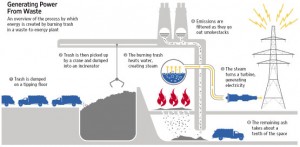Waste to energy, as well as specialised waste collection and management technologies are expected to develop and become even more efficient – an industry boom in its own right. At the moment ‘smart waste’ management and processing techniques in the industry as a whole have grown by sixteen percent on an annual basis – a notable expansion indeed. Currently, the most advanced waste management technologies have turned out to be plasma gasification, and optical waste sorting using special equipment.
A recently compiled and released report by Sandler Research has indicated that in the upcoming five years, one of the key issues to address is waste collection costs at a local or city level. Optimising removal and disposal means will save a tremendous amount of money, and will allow the waste management industry to grow at a healthy annual rate. The only way to reduce waste management costs on a municipal level is to implement smart waste technologies (when managing solid waste).
 One of the biggest issues when it comes to local waste collection is timing and routing. Authorities are forced to invest long hours in collection routes, which consumes more fuel and exhausts technical resources sooner than necessary. The report suggests the introduction of so called ‘smart bins’. These bins will be fitted with level indicators and wireless connection which should help authorities optimise their collection time and routes. It is expected for these bins to reduce waste collection expenses by fifty percent overall. Dealing effectively with solid domestic waste will be beneficial on a much greater scale. Improvement in this particular department will account for higher levels of public health, less overall pollution, fewer and slower climatic changes etc.
One of the biggest issues when it comes to local waste collection is timing and routing. Authorities are forced to invest long hours in collection routes, which consumes more fuel and exhausts technical resources sooner than necessary. The report suggests the introduction of so called ‘smart bins’. These bins will be fitted with level indicators and wireless connection which should help authorities optimise their collection time and routes. It is expected for these bins to reduce waste collection expenses by fifty percent overall. Dealing effectively with solid domestic waste will be beneficial on a much greater scale. Improvement in this particular department will account for higher levels of public health, less overall pollution, fewer and slower climatic changes etc.
The Sandler Research report also provides local authorities with detailed information on the latest and most efficient waste collection and management technologies which can be used to benefit entire communities. The report outlines key improvements and advancements in actual waste collection and transportation technology too – that being one of the biggest expenditures of any local authority.
Alongside proven and relatively effective waste management technologies like landfilling, composting, recycling and incineration (waste to energy schemes) which are already in use by many local authorities, the Sandler report also focuses on more advanced waste to energy methods like plasma arc gasification and pyrolysis which are quickly gaining momentum and will be the preferred waste management methods in the future.
Implementation of smart waste management technologies is becoming more and more necessary, especially for an ever growing metropolis like the British capital where landfill space is quickly running out and the city itself is spending large sums of money on collection and disposal using conventional means. The sheer fact that using smart waste management technologies will save the city nearly fifty percent in collection and disposal costs is more than sufficient reason to go through with many of the advancements. Smart waste management technology is expected to boom in developed countries in the upcoming years – a good indication that more governments are addressing the problem and moving in the right direction.



